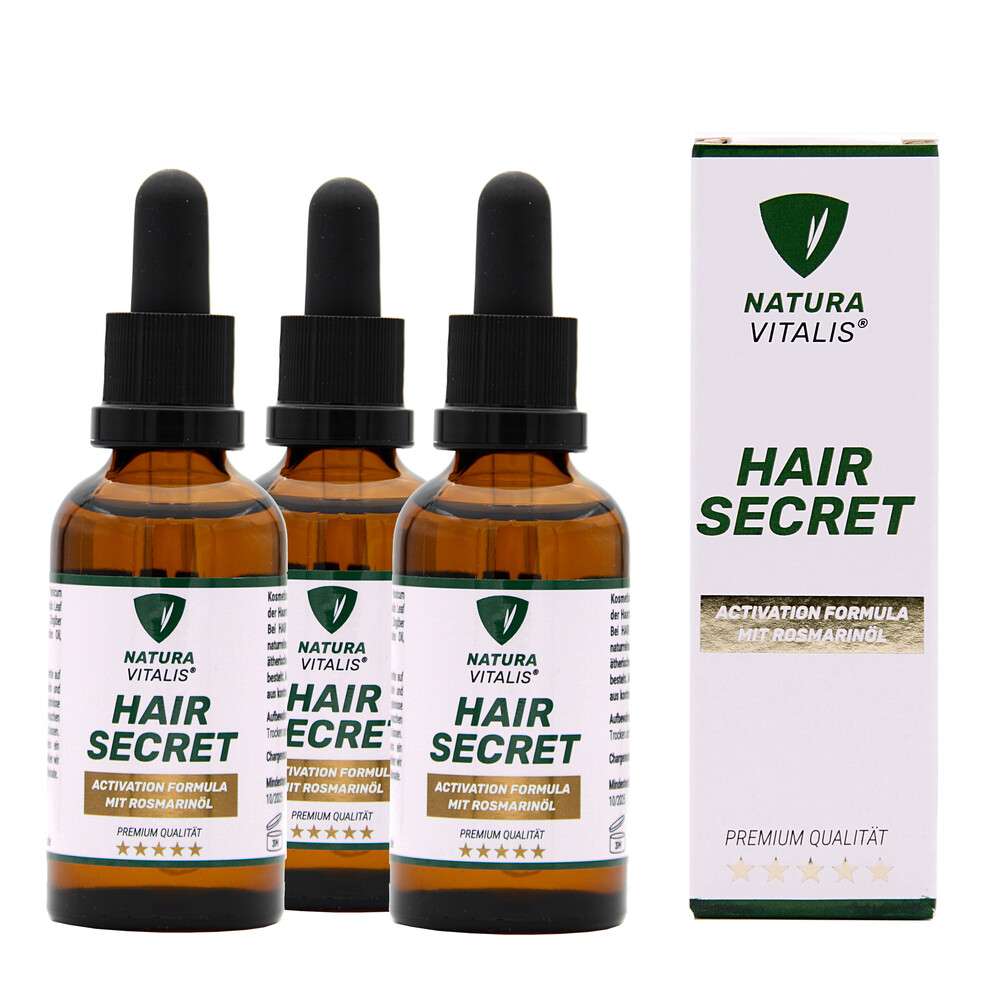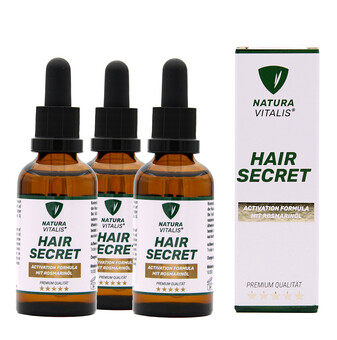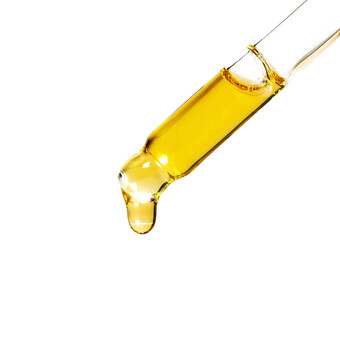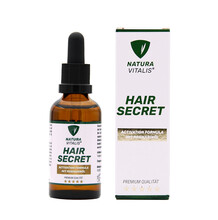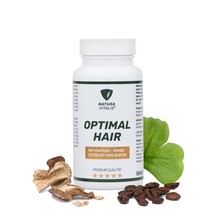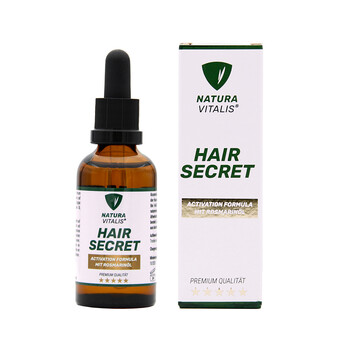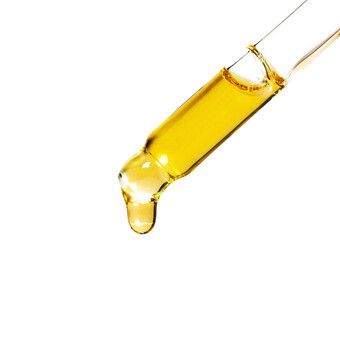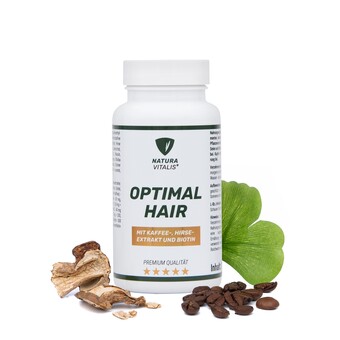Hair Secret
New, fuller hair without a hair transplant
When
hair starts to thin out and gradually recede to the back of the head,
many people are faced with the question: What now? A hair transplant is
expensive and time-consuming. If it is successful, the final result can
usually only be seen after a year.
The
alternative would be various hair growth products, which are available
in abundance on the market. However, the miracles that the adverts
attribute to these products do not exist. In the end, it is usually only
the manufacturers' coffers that are filled, but not the users' heads.
There
are currently only two drugs on the market that have been proven to be
effective against hair loss. These are the preparations minoxidil and
finasteride. However, the list of possible side effects is extremely
long and reads almost like an apocalyptic script. It includes swelling
of the face, shortness of breath, high blood pressure, dizziness,
depressive moods, cardiovascular reactions and loss of libido. And if
these preparations are then discontinued, hair loss can be even more
severe than it was before treatment began.
And
now? Does receding hair have to be a merciless fate? No, because there
is a simple, natural solution that seems rather unspectacular at first -
but only because we are often subject to the widespread misconception
that natural ingredients are not strong enough to promote hair growth.
However, this is wrong, which is why an ancient medicinal plant from
antiquity is currently celebrating an incredible revival on social media
such as Instagram and TikTok.
We're
talking about rosemary. Many of us are familiar with rosemary as an
intensely fragrant spice that is often used in Mediterranean cuisine.
Whether as a fresh whole sprig or as dried, chopped or ground leaves -
rosemary makes everything better: meat, fish, vegetables...and hair.
Yes, what sounds strange at first is an absolute miracle cure for hair
loss and dandruff in the form of oil. But that's not all. Rosemary oil
also stimulates the growth of new hair.
Beauty
creators, Instagram and TikTok users swear by the spice and celebrate
rosemary as the ultimate growth booster for new, strong and full-bodied
hair with countless videos. Is this all fake or does rosemary in the
form of an oil tincture really achieve these incredible results on the
scalp? No, it's not fake. The results are real and have now been
scientifically proven. Several studies have come to the conclusion that
rosemary oil can actually significantly improve hair growth and density.
At the same time, hair loss is stopped.
A
randomised comparative study from 2015 by the Baqiyatallah University
of Medical Sciences even showed that rosemary oil works better than the
drug minoxidil. In this study, 50 test subjects took the drug minoxidil
and 50 others rosemary oil. After a six-month test phase, significantly
more hair was detected in both groups. It was interesting to note that
the rosemary group performed better in this study, i.e. hair growth was
stronger than that of the minoxidil group. In addition, the test
subjects in the rosemary group had no side effects whatsoever.
How
is this possible? How can a completely natural medicinal herb achieve
such results? The secret lies in the broad-spectrum effect of rosemary.
This means that rosemary eliminates not just one cause of hair loss, but
all of them. It's like a broad-spectrum antibiotic that combats
different types of bacteria at the same time. And this is excellent
because not all hair loss is the same. In other words, the reasons for
hair loss can be very different and rosemary literally tackles each of
these causes at the root. It was not for nothing that rosemary was named
medicinal plant of the year in 2011.
For
example, the award-winning plant stimulates blood circulation in the
scalp. This is very important for the hair because it allows more oxygen
and nutrients to reach the hair follicles (growth cells), which in turn
makes the hair grow better and faster. Rosemary is also antimicrobial,
antifungal and antioxidant. With these properties, the medicinal herb is
also effective against microinfections on the scalp, which can also be a
cause of hair loss.
In
addition - and this is really sensational - rosemary inhibits the
enzyme 5-alpha-reductase. Incidentally, the effective drugs minoxidil
and finasteride also do this. However, rosemary does not produce the
horrendous side effects that can occur with these two drugs. But what
exactly is this 5-alpha-reductase enzyme and what does it have to do
with our head jewellery? Let's unravel this topic from the beginning,
because the 5-alpha-reductase enzyme plays a decisive role in whether
you walk around topless or not.
First of all, you need to know that, according to the German Endocrinological Care Centre (DEVZ),
hair loss is hormonal in around 95 percent of all men and women.
However, of the more than 100 known hormones in the human organism, only
one is responsible for hair loss. The name of the culprit is
dihydrotestosterone, or DHT for short. The tongue twister already
reveals that DHT must have something to do with testosterone. And that's
exactly the case. DHT is formed from testosterone and is, so to speak,
the much stronger variant of testosterone, which incidentally is present
in both women and men.
The
conversion of testosterone to DHT is important because DHT has various
tasks to fulfil in the human body. Among other things, it forms certain
proteins in the scalp that are important for hair growth. And the
conversion of testosterone to DHT takes place with the help of the
aforementioned 5-alpha-reductase enzyme.
So
far, so good. However, factors such as stress, lifestyle, diet,
medication, genetics and age can cause the body to produce too much of
the 5-alpha reductase enzyme. And too much of this enzyme means that too
much DHT is also produced from testosterone. And this is precisely the
main cause of hair loss, because if the DHT concentration in the scalp
is too high, a hormonal imbalance occurs which causes the blood vessels
in the scalp to shrink. As a result, the hair roots can no longer be
adequately supplied with nutrients. As a result, the new hair becomes
thinner and thinner until eventually no hair grows at all and the
follicles become inactive.
The
logical conclusion is that the production of the enzyme
5-alpha-reductase must be reduced. And this is exactly what rosemary oil
does when it is regularly massaged into the scalp over a period of at
least three months. By reducing the 5-alpha-reductase enzyme, the DHT
concentration in the scalp inevitably decreases. This restores the
hormonal balance and enables the regeneration of the shrunken blood
vessels. This regeneration now reactivates the hair follicles, which
leads to new, strong hair growth.
As
you can see, rosemary oil really does have an impressive range of
effects when it comes to hair. However, this range of effects can be
extended and optimised by combining rosemary oil with additional,
special oils and substances that use other mechanisms to stop hair loss
and stimulate hair growth at the same time. This is exactly what we have
done, and the result is a globally unique product called "Hair Secret".
In
addition to pure rosemary oil, it also contains thyme oil, peppermint
oil, ginger extract and millet seed extract. All these precious
ingredients strengthen the hair follicles so that the hair fibres are
better fixed. They also stimulate both blood circulation and hair
growth.
Millet seed
extract also has excellent protective and regenerative properties.
Studies have also shown that the miliacin contained in the cultivated
plant stops hair loss and supports hair growth. It was also found to
have a positive effect on hair diameter. The result is a beautiful,
voluminous head of hair.
The
ingredients show that with "Hair Secret" you have an outstanding
product that combines the crème de la crème of natural plants to make
your hair sprout again. The only thing "Hair Secret" cannot do is
shorten the hair growth cycle. This means that your new hair still needs
time to grow. On average, growth is around 1.2 cm per month. So the
order of the day is patience - or as the Zambian proverb says: "The
grass doesn't grow any faster if you pull on it."




